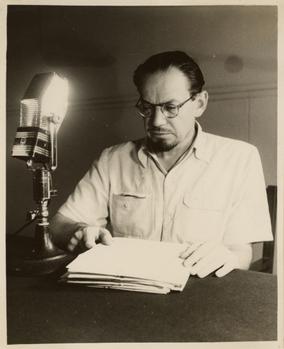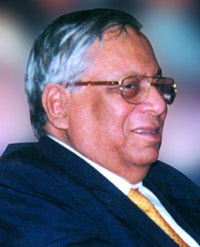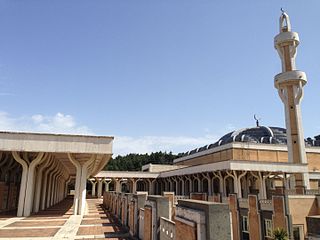Related Research Articles

The Society of the Muslim Brothers, better known as the Muslim Brotherhood is a transnational Sunni Islamist organization founded in Egypt by Islamic scholar and schoolteacher Hassan al-Banna in 1928. Al-Banna's teachings spread far beyond Egypt, influencing today various Islamist movements from charitable organizations to political parties.

The Islamic Center of Washington is a mosque and Islamic cultural center in Washington, D.C. It is located on Embassy Row on Massachusetts Avenue just east of the bridge over Rock Creek. When it opened in 1957, it was the largest mosque in the Western Hemisphere.
Abdul HadiPalazzi, legally named Massimo Palazzi is the secretary general of the Italian Muslim Assembly, and the Khalifah for Europe of the Qadiri Sufi Order. Controversially in Muslim circles, as of April 2010, he not only supported Israel's right to exist but also encouraged Jews to re-settle in Hebron.
Mohsen Vaziri Moghaddam, was an Iranian-born painter, sculptor, and a professor of art. He was most notable for his style of abstract expressionism, and was once referred to as the "pioneer of modern Iranian abstraction".

Abdul Rahman ibn Abdul Aziz al-Sudais, better known as al-Sudais, is the Chief Imam of the Grand Mosque, Masjid al-Haram in Makkah, Saudi Arabia; the President of the Affairs of the Two Holy Mosques; a renowned Qāriʾ ; he was the Dubai International Holy Qur'an Award's "Islamic Personality Of the Year" in 2005. Al-Sudais has preached Islam's opposition to "explosions and terrorism", and has called for peaceful inter-faith dialogue, but also been criticized for vilifying non-Muslims and especially Jews in his sermons. He has denounced the treatment of Palestinians by Israeli settlers and the state of Israel, and called for more aid to be sent to Palestinians. He has also been noted for identifying women's un-Islamic behavior as in part responsible for the winter 2006 drought in Saudi Arabia. In 2016, he delivered the very important Hajj sermon to a multitude of pilgrims gathered at Arafat after prayers.

Muhammad Asad was an Austro-Hungarian Muslim polymath, born in modern day Ukraine. He worked as a journalist, traveler, writer, political theorist, and diplomat.

Gregory III Laham, B.S., Emeritus Patriarch of Antioch and All the East, of Alexandria and Jerusalem, is the former spiritual leader of the Melkite Greek Catholic Church. He was elected on November 29, 2000, succeeding Patriarch Maximos V Hakim. He retired on May 6, 2017.
During his papal tenure, Pope Benedict XVI focused on building on the outreach of his predecessors towards Islam, particularly on the efforts of Pope John Paul II, who experts say established trust and opened opportunities for dialogue with Muslims. One of the important milestones in the Pope's efforts included a religious and peaceful initiative called A Common Word. This was provoked by a 2006 lecture he delivered at a university in Regensburg, Germany, which prompted Muslim leaders to gather and make overtures to their Christian and Jewish counterparts. Later on, Pope Benedict pursued key initiatives that helped foster Christian and Muslim dialogue. These were founded on the Pope's belief that Christians and Muslims have shared religious experience and that Christianity and Islam are both theologically founded in "God's irruptive call ... heard in the midst of man's ordinary daily existence."

Romanzo criminale is an Italian-language crime drama film released in 2005, directed by Michele Placido. It was highly acclaimed and won 15 awards. It is based on Giancarlo De Cataldo's 2002 novel, which is in turn inspired by the true story of the Banda della Magliana. The Magliana gang was one of the most powerful Italian criminal associations, dominating Rome's drug, gambling and other kinds of crime activities from the early 1970s until the death of Enrico De Pedis in 1992. The gang's affiliates started their career kidnapping rich people, drug dealing. From the 1970s they started working with the Italian secret service, fascists, terrorists, the Sicilian Mafia, the Camorra, and many more. Some gang members are still alive, as inmates of an Italian prison, or justice collaborators.
Giovanni Stradone or Giovanni Stradóne was an Italian painter. He was a figurative painter who worked in a personal expressionist style. His work was part of the painting event in the art competition at the 1948 Summer Olympics, where he won a silver medal. He is not to be confused with Giovanni Stradano or Jan Van der Straet (1523–1605), a Flanders-born artist active mainly in 16th-century Florence.
The Indonesian Association of Muslim Intellectuals is a Muslim organization in Indonesia. Founded in 1990 by Indonesian Secretary of Research and Technology B. J. Habibie, the organisation is committed to fight against poverty and improve education in Indonesia.

The history of the Jews in Saudi Arabia begins in classical antiquity.

Humayun Rasheed Choudhury was a Bangladeshi career diplomat and Speaker of the Bangladesh National Parliament from 1996 to 2001. He was elected president of the 41st session of the UN General Assembly in 1986. He was awarded Independence Day Award in 2018 posthumously by the Government of Bangladesh.

The unification of Saudi Arabia was a military and political campaign in which the various tribes, sheikhdoms, city-states, emirates, and kingdoms of most of the central Arabian Peninsula were conquered by the House of Saud, or Al Saud. Unification started in 1902 and continued until 1932, when the Kingdom of Saudi Arabia was proclaimed under the leadership of Abdulaziz, known in the West as Ibn Saud, creating what is sometimes referred to as the Third Saudi State, to differentiate it from the Emirate of Diriyah, the First Saudi State and the Emirate of Nejd, the Second Saudi State, also House of Saud states.

Kosovo–Saudi Arabia relations are foreign relations between the Kosovo and Saudi Arabia. Like Saudi Arabia, Kosovo has a mainly Muslim population.

Scuola romana or Scuola di via Cavour was a 20th-century art movement defined by a group of painters within Expressionism and active in Rome between 1928 and 1945, and with a second phase in the mid-1950s.

The Mosque of Rome, situated in Parioli, Rome, Italy, is the largest mosque in the Western world in terms of land area. It has an area of 30,000 m2 (320,000 sq ft) and can accommodate more than 12,000 people. The building is located in the Acqua Acetosa area, at the foot of the Parioli Mounts, north of the city. It is also the seat of the Italian Islamic Cultural Centre.

The 2017 Riyadh summit was a series of three summits held on 20–21 May 2017 on the occasion of the visit of United States President Donald Trump to Saudi Arabia, his first trip overseas. The summit included one bilateral meeting, between the United States and Saudi Arabia, and two multilateral meetings, one between the members of the Gulf Cooperation Council and the other with Arab and Muslim countries. Leaders and representatives of 54 Arab and Muslim countries, all members of the Organisation of Islamic Cooperation, and the United States took part. Iran and Turkey boycotted the summit, and Syria was not invited.

Mario Rossi (1897-1961) was an Italian architect and notable contributor to 20th-century Islamic architecture.

Vittorio Giulio Ippolito Camillo Scialoja was an influential Italian Professor of Jurisprudence. His early focus was on Roman law, but he later broadened the scope of his research and teaching to embrace other branches of civil law. Membership of the National Public Council for Higher Education, on which he served between 1893 and 1913, led to his nomination as a senator on 4 March 1904. That in turn became the launch pad for an increasingly engaged parallel career in politics and public life. He served briefly as Minister of Justice in 1909/10, Minister without portfolio between 1916 and 1917, and as Minister of Foreign Affairs during 1919/20.
References
- ↑ Reuters